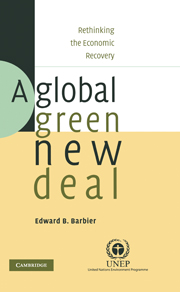Book contents
- Frontmatter
- Contents
- List of figures
- List of tables
- List of boxes
- Foreword
- Preface
- Acknowledgements
- Part I Why a Global Green New Deal?
- 1 Introduction: opportunity from crisis
- Part II The Key Components of a Global Green New Deal
- Part III The Role of the International Community
- Part IV Towards a Greener World Economy
- Appendix 1 PIIE–WRI analysis of a green recovery program for the United States
- Appendix 2 Pew comparative analysis of clean energy jobs and investments in the United States, 1998–2007
- Glossary
- Index
- References
1 - Introduction: opportunity from crisis
Published online by Cambridge University Press: 05 June 2012
- Frontmatter
- Contents
- List of figures
- List of tables
- List of boxes
- Foreword
- Preface
- Acknowledgements
- Part I Why a Global Green New Deal?
- 1 Introduction: opportunity from crisis
- Part II The Key Components of a Global Green New Deal
- Part III The Role of the International Community
- Part IV Towards a Greener World Economy
- Appendix 1 PIIE–WRI analysis of a green recovery program for the United States
- Appendix 2 Pew comparative analysis of clean energy jobs and investments in the United States, 1998–2007
- Glossary
- Index
- References
Summary
2008 will be remembered as the year of multiple global crises. It began with a looming fuel crisis, as well as continued rises in food and commodity prices. Towards the end of the year the world was confronted with a major financial crash, which quickly turned into the worst international economic recession since the Great Depression. By mid-2009 there were signs that the economic recession was easing, but any ensuing recovery has been projected to be long, protracted and vulnerable to further disruption. Global unemployment and poverty are still on the rise, and some economic sectors continue to contract. There is also concern that, as the world economy recovers, it remains vulnerable to the problems posed by other global challenges, such as climate change, energy insecurity, growing freshwater scarcity, deteriorating ecosystems and widespread poverty in developing economies.
These crises have serious implications for human welfare and well-being worldwide, especially in terms of unemployment, poverty and environmental impacts. They may also provide a unique opportunity, however, for governments to come together to promote sustainable economic development at the global level. This book outlines one possible strategy for creating such an “opportunity from crisis.”
Faced with the social and economic consequences of a deepening world recession, or – at best – a weak, unstable and protracted recovery, it may seem something of a luxury to consider at this time policies that aim to reduce carbon dependency and environmental degradation. Such a conclusion is both false and misleading, however.
- Type
- Chapter
- Information
- A Global Green New DealRethinking the Economic Recovery, pp. 3 - 30Publisher: Cambridge University PressPrint publication year: 2010



